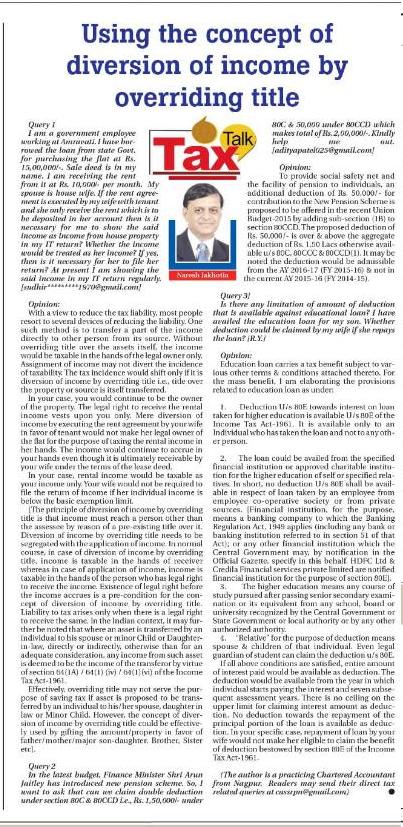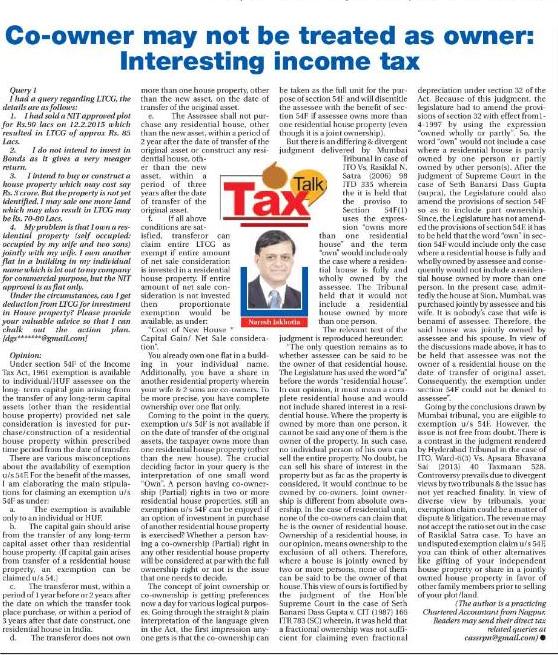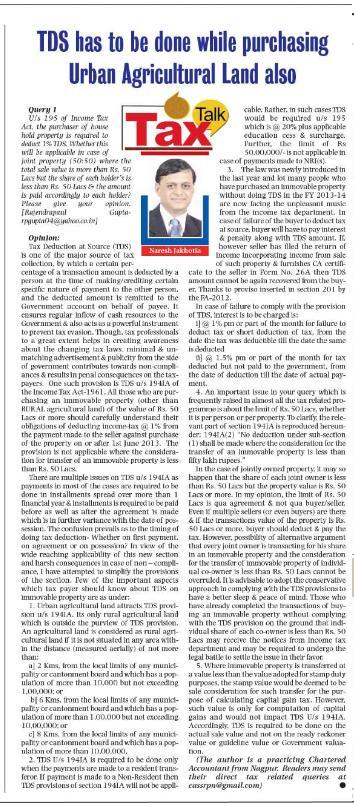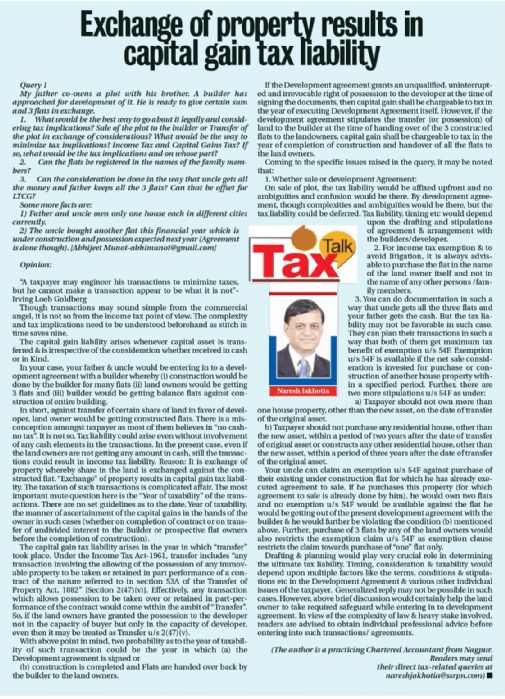Article Details
| TWO PERSON WITH SAME INCOME MAY HAVE DIFFERENT TAX LIABILITIES !! |
INTERESTING INCOME TAX-CA NARESH JAKHOTIA“EVEN IF TWO PEOPLE HAVE SAME INCOME, THE TAX AMOUNT COULD DIFFER” “When there is an income tax, the just man will pay more and the unjust the less on the same amount of income”- Plato. Even if two people have same income the tax could differ. Its an Interesting Tax – The Income Tax. Tax planning, as a whole, is incomplete without talking about the investment. In our routine life, we professionals come across number of instances wherein investment in the wrong instruments or at the wrong timing or in the wrong name have imposed additional tax burden on the tax payer. It’s painful but the fact remains, tax planning is a valid powerful weapon in the hands of assessee. With the fall in value of rupee and turbulence in the equity market, the yellow metal has gained more shine than before. For centuries, it is considered as the safest investment option. Indians invests in the Gold, not for the purpose of usage alone but also for the sake of investments & returns. Over centuries, people are holding gold in physical forms as their preferred mode of investment. Time has changed and now an alternative for investing in Gold has emerged which, even though more better, is less preferred. Obviously, awareness & benefit by we professional could create the required momentum for investment through this new tool. I am talking about the investment in Gold Exchange Traded Fund (ETF). ETFs, though regarded as Mutual Funds, are different from the latter. The most important benefit of an Exchange Traded Fund is its tax efficiency owing to its origin. Gold ETFs are superior from the tax perspective as compared to physical holding of Gold in the form of bars/ coins/ jewellery. Equally, they also score well on convenience of storage and disposal, even though such convenience may entail a cost in terms of a charge. It could be considered as a safe and return oriented investment as it is theft free. Gold, physical or ETF, is a capital assets (ignoring businessmen dealing in Bullion) under the Income Tax Laws & sale transaction would yield capital gain or loss. Though investment in God ETF has its own merits in terms of convenience of acquiring it and its resale value, it also carries beneficial tax consequences. There are certain tax advantages associated with buying gold Exchange Traded Funds (ETF) over the physical buying of gold, as under: Holding Period to Qualify as a Long Term Capital Assets: Gold ETF, being Mutual Fund units, the minimum holding period for such assets to qualify as long-term capital assets is a year. For physical Gold, the period would be long holding of 3 years only. Gold has to be held for three years to be termed as long-term capital assets, while gold ETF need to wait for just a year to get the status. Taxability & Tax Rate: As Gold ETF are not equity oriented mutual funds, long-term capital gains (LTCG) on the sale of gold ETF’s is not entitled for the tax exemption. Also, Short-term capital gains (STCG) would be taxed at a normal rate & would not be eligible for concessional rate of taxation of 15% applicable in case of sale of shares through recognized stock exchange. However, these are eligible for the concessional LTCG tax rate at a minimum of 10% of the gains without indexation or 20% of the gains with indexation. Effectively, if you sell your gold ETF after 12 months, you would need to pay just 10 per cent of gains as tax; while in case of gold sale after a year, the tax rate will be much higher. Exemption against LTCG: LTCG arising on sale of any long term capital assets other than residential house property is eligible for an exemption under section 54F and 54EC. Gold ETF becomes a long term capital asset in just one year as against physical gold which needs at least three years to avail such exemptions. Wealth Tax Benefit: Physical Gold bars are liable to wealth tax which is presently @ 1% of the market value of the assets exceeding Rs 30 Lacs. Gold ETF are not subject to wealth tax as wealth tax is levied only on specified assets and gold ETF remain outside the purview of specified assets. Convenience of selling: Selling or disposing off the Gold ETF could be done in installment or as per the convenience of timing and is more transparent and cost effective as compared to selling the physical gold. Accounting convenience: Recording the transaction of purchase / Sale is easy & convenient in case of Gold ETF. The strong documentary support is available in case of investment through this mode as against the purchase of gold in physical forms where even the genuine purchase bills are questioned and cross examined. True, there are only two things that are certain in life- the Death & Taxes. But the incidence of taxes could be minimized to a great extent by planning the investment through right vehicle. [The author is a partner of M/s. SSRPN & Co]] |
 |




.png)




